
DOES FINANCE BENEFIT SOCIETY?
A LANGUAGE EMBEDDING APPROACH
We ask a simple question ... what emotions do you feel when you hear the word "finance." We could see many finance professionals (most people reading this) have pleasant feelings about it. However, the sentiments differ across different regions and across time. In this paper, we look at Google's book data to see how the average denizens of eight countries view finance from 1870 to 2009 and how that affects economic outcomes.
Presentations
- Greater China Area Finance Conference 2020
- Norwegian School of Economics 2021
- NYU Shanghai Volatility Institute 2020, Video Link
- Michigan State, UI Chicago (Virtual Finance Seminar) 2020, Video Link
- Washinton University 2020
Media Coverage
- Bloomberg Opinion, Washington Post: Can the Finance Industry Be Trusted This Time? (PDF)
- ProMarket: Do People Think Finance Benefits Society? (PDF)
Abstract
We measure popular sentiment toward finance using a computational linguistics approach applied to millions of books published in eight countries over hundreds of years. We document persistent differences in finance sentiment across countries despite ample time-series variation. Finance sentiment declines after epidemics and earthquakes, but rises following droughts, floods, and landslides. These heterogeneous effects of natural disasters suggest finance sentiment responds differently to the realization of insured versus uninsured risks. Using local projections, we find that positive shocks to finance sentiment have positive and persistent effects on economic growth. Our estimates predict a contraction in finance sentiment due to the COVID-19 pandemic that will exacerbate its long-term economic damage.
Key Figures

